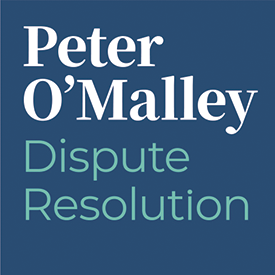To have different points of view is an integral part of the human condition, where the ability to question and debate deep seated beliefs has been critical to human development. A dispute is simply as a disagreement or argument, as can happen in our daily lives, which in most instances can be resolved quickly.
Sometimes disputes escalate, particularly in trade and commerce, where it is not possible to submit every commercial dispute to the courts. It is not in the interests of healthy society to allow disputes to continue and be disruptive as a barrier to good relations. Alternative Dispute Resolution (ADR) describes the range of processes that are available to resolve disputes without the necessity to refer to the courts. Each process involves an experienced and independent third party, such as Peter O’Malley, to assist parties in reaching a resolution to their dispute that is both expedient, economic, and appropriate to the nature of the dispute.
One of the benefits of ADR is that the parties in dispute have control over how they wish to seek resolution in a confidential manner. This is not the case in reference to the court. The court is a public forum where the timetable and process, will be determined by the court, usually at considerable cost and with an extended timescale. A further advantage of ADR is that the parties can choose the process that fits the character of the dispute, either in seeking a consensual or an imposed resolution, where the forum can fit the fuss.
ADR Services
Negotiation
Early engagement in negotiation is probably the easiest way to solve any dispute. The opportunity to negotiate arises at the beginning of a dispute when the possibility to resolve a difference can be achieved with a minimum of detriment and cost.
Mediation
Mediating a settlement can often protect ongoing business relationships. If direct negotiation is unsuccessful the parties can appoint an independent mediator to help in seeking a negotiated settlement.
Adjudication
Adjudication is a dispute resolution method that allows either party to submit their dispute to an independent third party for an imposed decision. Adjudication is quick and relatively affordable but adversarial in nature.
Conciliation
Conciliation can provide a neutral recommendation to end the dispute. Like mediation, the primary purpose of conciliation is to assist the parties to reach an agreed settlement in their dispute.
Arbitration
Arbitration is an adversarial process that avoids the higher costs of litigation. Arbitration will normally result in a binding award that in the absence of compliance by the losing party will be enforceable by an application to the court by the successful party.

“Controversial
disputes are a part of
democratic culture.”
Angela Merkel,
German politician

